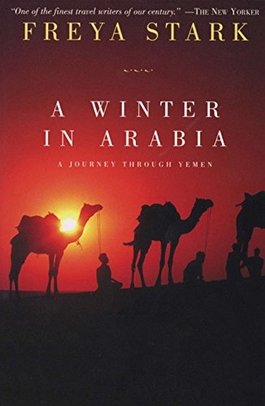
I first learned of Stark’s travels from Neither East Nor West, Christiane Bird’s account of her own extended visit to 1990s Iran. The title is an allusion to Stark’s 1945 East is West, based on her wartime experience with the British Ministry of Information in Arabia. Stark’s travels in the Middle East had begun in 1927 with her first visit to Lebanon, and by 1931 she had traveled three times to Iran, to parts previously unexplored by Westerners, including men. Most famously, she pinned down the location of the storied Valleys of the Assassins. (The English word comes from the Arabic hashishiyyin, or a similar Farsi word for “hashish eaters,” as the fabled killers would commit their acts after intoxicating themselves).
Winter in Arabia describes in very humanizing detail her 1937-38 expedition to what is now Yemen. She traveled with a female archeologist and another woman. Stark’s attitude towards the locals is enlightened for the time:
We are in a proud country still new to Europeans, the first foreigners to live in its outlying districts for any length of time; and the hope that I cherish is that we may leave it uncorrupted, its charm of independence intact. I think there is no way to do this and to keep alive the Arab’s happiness in his won virtues except to live his life in certain measure. One may differ in material ways; one may sit on chairs and use forks and gramophones; but on no account dare one put before these people, so easily beguiled, a set of values different from their own. Discontent with their standards is the first step in the degradation of the East.
And she does live their life, as reflected in this passage about two of her hosts, and a situation in which jewelry has disappeared:
[The presumed thief] appeared, dressed for the feast, with finger-joints and palms yellow with henna and festal ringlets round her wizened old face…. She had taken no rings, she said.
‘Well, then,’ said Qasim, ‘you will have to drink the talisman that the sayyid has prepared for you, and if you are speaking the truth nothing will happen, but if you took the rings you will swell out like this’—he made a balloon-like gesture in front of his own slim tummy.
The floodgates of eloquence were now loosened. She stood with upraised hands, her rust-coloured dress and blue cloak draped about her like some Mater Dolorosa of a rather florid period, her voice rising in squeaks equally inspired by injured innocence and the prospect of drinking the sayyid’s charm.
‘It can’t do you any harm,’ I said at last. ‘It is words of the Quran, and they only harm the wicked. I will drink too, so that you may not fear.’
Stark’s writing has much the tone of her contemporary Graham Greene in his travel writings, much of it obviously taken from diary. But her descriptions are more vivid. And she went everywhere the bravest Western men went, and beyond, into the world of women, so closed to these male explorers.
 RSS Feed
RSS Feed